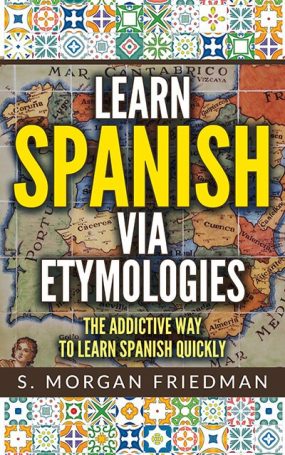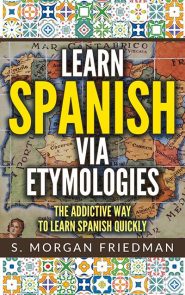Brindar, Brindis and Bring
- Posted by Morgan
- on Apr 24, 2024
- in True Spanish Etymology Stories
Brindis (a “toast”, in the sense of saluting someone before you drink alcohol) and brindir (“to provide”) both come from the same origin — through a funny story.
In 1527, the German king Charles V sacked Rome — and the soldiers, when sacking the city, screamed out in victory constantly, “Ich bring dir’s!”, meaning, “I’m bringing it!” (“It” here refers to victory, the new king, a new beginning, etc.). This phrase then became popular and repeated around Rome (in Italian), in different senses: it became the toast that everyone used to the new king; and it also entered popular usage in the same sense, of bringing or providing. Then, the word was copied from Italian into Spanish. And, separately, bring, although a German word, is the same word in English. Remember, English is a Germanic language, after all (despite all those French words since 1066 and all that!).
We can thus see the br-n-d of brindis and brindar map to the br-n-g of bring quite clearly. The d/g sounds often swap places as well, thus making the g/d switch make sense: they do sound quite similar, after all.
- See more of this pattern: True Spanish Etymology Stories
Costilla and Coast, Accost
- Posted by Morgan
- on Apr 18, 2024
- in True Spanish Etymology Stories
Costilla, Spanish for “rib,” is a close cousin of the English coast and accost. All come from the same Latin root, costa, meaning, “side.”
Thus, your rib is literally, “what which is on your side” and to accost is literally, “to come up to you from the side” and, of course, the coast is the definition of the side, your side boundary.
The c-s-t root is clearly visible in all descendents of costa.
- See more of this pattern: True Spanish Etymology Stories
Caro and Whore, Cher
Today’s is a good one!
The Spanish caro (simply, “expensive”) has a fun provenance: from the ancient (pre-Latin) Proto-Indo-European root karo– that meant… whore. Yes, the ancient word karo turned into the almost-as-ancient Latin word carus meaning “expensive,” from which we get the modern Spanish word caro, still meaning “expensive.”
So the prostitutes of the ancient world, apparently, weren’t cheap!
Interestingly, we can even see a linguistic connection between the words. The k- sound in Proto-Indo-European stayed the same sound as it evolved into Latin and then Spanish (although usually written with a c-); but as Proto-Indo-European evolved simultaneously into ancient German and then into English, that k- sound became the silent or almost-silent h- or wh-. Think when and cuando, for example. So, we can see therefore that the c-r of caro maps to the wh-r of whore.
The funniest part, however, is that the ancient Latin carus, for expensive, as Latin evolved into French, turned into the French… cher, for “dear”: in the sense of, “My dear friend!”. The exact opposite of a whore! Thus, in French, prostitute became expensive which became that which is dear to you!
Turbio and Disturb
- Posted by Morgan
- on Apr 16, 2024
- in True Spanish Etymology Stories
Turbio, Spanish for “cloudy”, comes from the same Latin root as the English disturb: turbidus, meaning, “turmoil; full of confusion; muddy.”
It is easy to see how this one root evolved in time into both the English disturb and the Spanish turbio. Think of a cloudy day, just about to rain: the skies are in turmoil! The Gods are about to fight with one another!
We can see the t-r-b root clearly in both. And the English turbid also comes from the same root, although that word is used only on the SATs.
- See more of this pattern: True Spanish Etymology Stories
Cobrar and Recuperate
- Posted by Morgan
- on Apr 16, 2024
- in True Spanish Etymology Stories
The Spanish cobrar (“to charge”; in the sense of, to charge a fee or collect a payment) comes from the older Spanish recobrar (meaning, “to recuperate”) — which itself comes from the Latin recuperare for the same “to recuperate.”
We can see the c-b-r mapping to the c-p-r clearly, since the -c- and -p- are often interchanged.
Lesson: charging for something is really just recuperating money that is owed to you anyway!
- See more of this pattern: True Spanish Etymology Stories
Eje and Axle
- Posted by Morgan
- on Apr 14, 2024
- in SH to J
The Spanish eje for “axle” comes from the Latin for the same, axis. The English axle comes from the same common ancestor as the Latin axis, the proto-indo-european root *aks– also meaning the same.
The Spanish eje is easy to understand if we remember that most of the x/sh/ch sounds in Latin and the ancient languages became the throat-clearing -j- sound in Spanish. Thus, the e-j of eje maps to the a-x of axle pretty clearly.
It’s interesting how such a simple word has remained mostly unchanged for tens of thousands of years. Perhaps, the axle is one of the most fundamental discoveries in human history. It is, after all, what led to the wheel, which led to… civilization.
- See more of this pattern: SH to J
what is the etymological way to learn spanish?
Nerds love to pattern-match, to find commonalities among everything. Our approach to learning languages revolves (the same -volve- that is in “volver”, to “return”) around connecting the Spanish words to the related English words via their common etymologies – to find the linguistic patterns, because these patterns become easy triggers to remember what words mean. Want to know more? Email us and ask:
morgan@westegg.com

